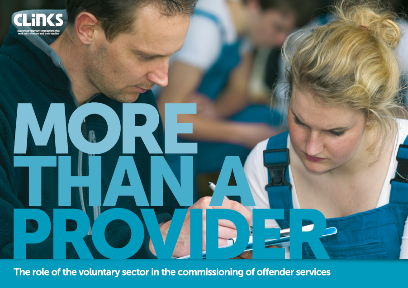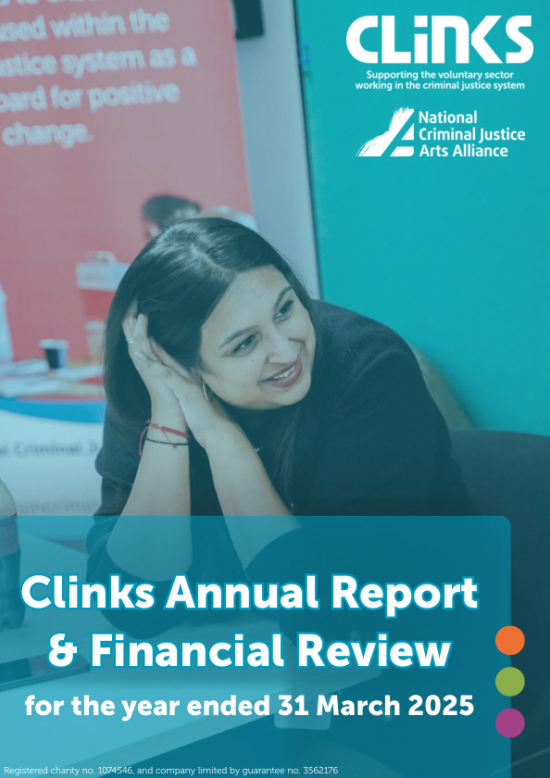Clinks has interviewed frontline organisations over the course of a year to find out about their experience of trying to engage in commissioning. We also spoke to commissioners themselves and held a discussion workshop to hear from both providers and commissioners. This rich information helped us develop a vision of good commissioning for rehabilitation and desistance.
Click here to download the report…
More Than A Provider: The role of the voluntary sector in the commissioning of offender services
We heard lots of great examples of good practice, including using the expertise of voluntary organisations to assess service user need; clear information about tendering processes and key contacts; and grants to support partnership development. But we also heard about over-stretched commissioning teams that have less time to develop collaborative commissioning or get out and meet service users; and insufficient measures to prevent the loss of high-quality, locally rooted organisations in an increasingly crowded market.
Commissioning is not just about tenders and contracts, but is the whole dynamic process of assessing needs, designing services, delivering and reviewing them. Voluntary organisations have a role in this whole cycle; they are advocates, campaigners, sources of vital information on service user need, a critical eye on existing services and innovators that drive social change.
Here are the 10 elements we identified that make for great commissioning:
- Involve the voluntary sector as more than a provider: The voluntary sector is not just a provider of services, it has a key role in informing needs assessments, scrutinising and reviewing existing services and advocating for change.
- Involve service users and ex-offenders in commissioning: There are many ways of involving service users. However it is achieved, it is vital that commissioning teams are grounded in the reality of the day-to-day lives of service users.
- Address complex needs holistically: Many people in the Criminal Justice System have a range of complex problems that need to be addressed together, but commissioning is sometimes siloed.
- Commission services for equality groups: One-size-fits-all services will not work for many offenders. Commissioners need to engage with equality groups to design and deliver specialist services.
- Maximise market diversity: The consequences of not developing a diverse market of service providers can be costly, but often commissioners struggle to enable smaller organisations to participate.
- Facilitate collaboration: Collaboration is valuable, but takes time and resources; and competitive tendering can affect relationships between local providers.
- Encourage subcontracting: The prime/subcontractor model is fast becoming the dominant model in commissioning, but more thought needs to be given to the relationship between commissioner and subcontractor.
- Enable innovation and measure the right results: It can be challenging to define and measure progress towards desistance, but embedding social value into commissioning decisions can help.
- Use grants as well as contracts: Grants can be a cost-effective way of investing in organisations that carry out activity which achieves social outcomes desired by commissioners.
- Re-tender and decommission effectively: Re-tendering involves costs to the commissioner, current provider and bidders, and is not always necessary. The complexity of the procurement process should be proportionate to the scale of the service being commissioned.
Read more…
More Than A Provider: The role of the voluntary sector in the commissioning of offender services
Access other commissioning resources
We’d like to hear your views, please leave a comment below!
- What’s your experience? What do you think are the elements of great commissioning?
- If you’re a commissioner, how have you worked with voluntary organisations to co-design services?
- As a voluntary organisation, what has been your experience of getting involved in all stages of the commissioning cycle?
What's new
Blogs
Anne Fox CEO of Clinks to stand down after a decade of service
Latest on X
The role is for a leader from an organisation focused on racially minoritised people, with expertise in service delivery, policy, advocacy, or related areas in criminal justice. Racial disparities are present at every CJS stage. This role ensures these voices are central in shaping policy to help address and eradicate them. Apply by Mon 18 Nov, 10am. More info: https://www.clinks.org/voluntary-community-sector/vacancies/15566 #CriminalJustice #RR3 #RacialEquity

